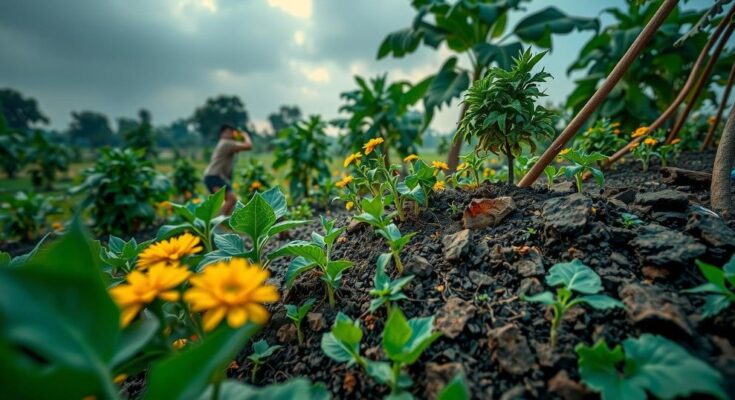The upcoming COP29 conference will address the role of technology in enhancing agricultural resilience to climate change, focusing on the ethical application of AI to improve food security, particularly in Africa. The article emphasizes the need for equitable access to these technologies, urging African governments to advocate for the needs of vulnerable populations to ensure sustainable food production.
At the upcoming COP29 climate change conference in November, the spotlight will once again shine on our methods of land use and food production to support a growing global population, all while evaluating the environmental impact of these practices. The conference will particularly emphasize the role of new and emerging technologies in enhancing agricultural resilience against the backdrop of climate change. Key questions include: What technological approaches can effectively provide nutrition amid changing climates? How can we mitigate the detrimental effects of food production on our environment? As a plant biotechnologist engaged in research on superior plant genetics, my focus is on identifying and propagating seeds that are resilient in the face of climatic shifts. Our work encompasses preserving vital genetic traits in endangered species and indigenous African crops, thereby addressing both food security and conservation challenges. Methods such as cryopreservation and tissue culture are utilized to conserve germplasm, which encompasses critical traits from plant material. We have devised innovative breeding programs aimed at producing resilient and nutritious crops that withstand adverse conditions. With advancements in biotechnology, we can alter and enhance plant genetics, enabling greater resistance to pests and harsh climates. Artificial intelligence (AI) further enhances this field by automating complex problem-solving through machine learning algorithms, allowing for the identification of valuable traits in plants, which can lead to the cultivation of crops suitable for diverse environments. AI brings three transformational advantages to agriculture: it processes vast datasets related to soil and weather, optimizes workflows by adjusting agricultural inputs in real time, and facilitates informed decision-making through constant monitoring. I firmly believe that the ethical application of AI will be instrumental in achieving food security amid climate change. Moreover, AI has made significant strides in understanding protein configurations, which constitute the core of all living organisms and are essential in food production. In October 2024, the Nobel Prize in Chemistry recognized the groundbreaking work of scientists in decoding protein structures using the AlphaFold platform—a feat that will advance the design of novel proteins for food and health applications. However, the application of AI in agriculture remains disproportionately accessible, driven by disparities in resources, investment, and support across the globe. Africa, projected to benefit significantly from AI advancements for food security, currently lags in adopting new food production technologies. The adverse effects of climate change disproportionately impact impoverished populations, making it imperative for African governments to assert a strong presence at COP29. They must advocate for AI advancements in agricultural practices that prioritize the needs of the most vulnerable communities. Large corporations must not monopolize these transformative technologies, as historical trends indicate negative consequences regarding equitable access and pricing. Therefore, it is essential for African nations to stimulate innovation and investment independently, tailoring climate resilience technologies to their distinct contexts. The message to be conveyed at COP29 is clear: as AI augments global food production efficiency, it must also account for the location and needs of vulnerable communities, ensuring that the surplus generated through these technologies is distributed equitably. In conclusion, it is critical to harness the potential of AI and biotechnology to enhance agricultural resilience while protecting natural ecosystems. Engaging with these technologies in a manner that prioritizes ethical distribution and access will be essential in navigating the challenges posed by climate change. By advocating for inclusive technological advancements, we can work towards sustainable food security for all, particularly the most disadvantaged sectors of society. Ultimately, COP29 must address the importance of collective action and global cooperation in ensuring that AI benefits everyone, particularly those communities most affected by food insecurity and climate change.
The topic underscores the significance of utilizing emerging technologies like artificial intelligence in addressing food security challenges in Africa amidst climate change. As the global population continues to expand, the demands on agriculture and natural resources intensify, necessitating innovative approaches to sustainably meet nutritional needs. This backdrop positions COP29 as a critical platform for discussing technological solutions tailored to enhance resilience in agricultural systems while minimizing environmental impacts. The article advocates for equitable access to these advancing technologies, urging African governments to lobby for their strategic integration into regional food production practices for the benefit of vulnerable populations.
In summary, the integration of artificial intelligence and biotechnology presents crucial opportunities for enhancing agricultural sustainability and resilience in the face of climate change. It is imperative for African governments to vocally advocate for equitable access to these technologies at COP29, ensuring that advancements in food production systems prioritize the needs of impoverished communities. In doing so, we can foster a more just and sustainable future for food security across the continent.
Original Source: theconversation.com




